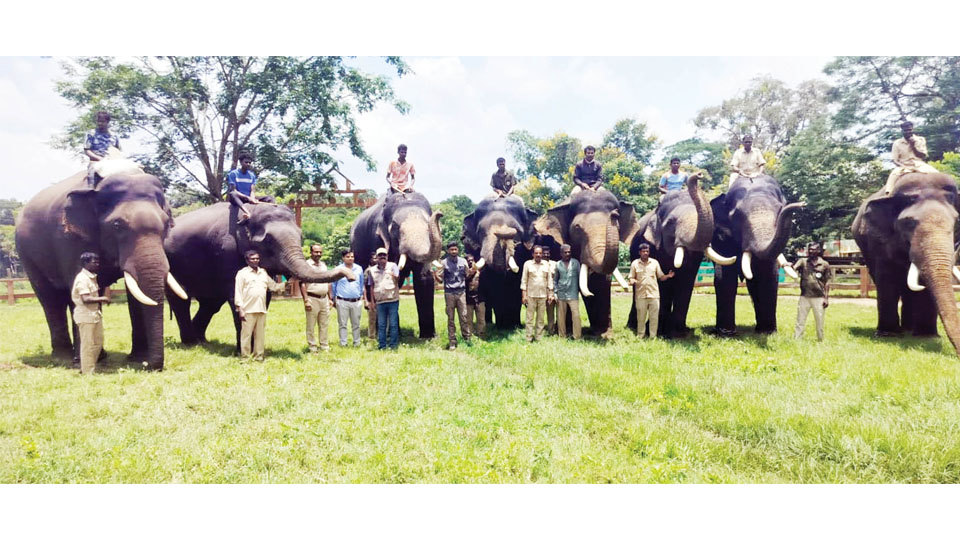Final list of participating pachyderms only after results of pregnancy test
By M.T. Yogesh Kumar
Mysore/Mysuru: Preparations for the Gajapayana (elephant march) on Sept. 1 for the Dasara festivities in Mysuru have already commenced. Before finalising the list of elephants participating in the festival, the identified elephants have undergone acclimatisation tests with firecrackers to prevent any fearful reactions during the event’s hustle and bustle.
All the elephants scheduled to participate in the 2023 festivities have successfully passed the firecracker test. Elephants play a vital role in the success of the Dasara celebrations and the tradition of bringing elephants from various Elephant Camps to Mysuru city for training has been ongoing since decades.
However, with the number of experienced elephants declining, the Forest De-partment has begun the process of taming new elephants capable of carrying the Golden Howdah for the next 5 to 10 years.
One of the senior elephants, Captain Abhimanyu, who is currently 57 years old, will retire in three more years, necessitating the training of new elephants for this important role. As a result, new elephants will be introduced into the Dasara yard this time, forming a new team when combined with the elephants that arrived last year. To ensure their successful participation, various training sessions are being conducted at the camps.
The training aims to ensure that the new elephants along with the experienced ones are not frightened by the sounds of vehicles, sirens and explosives during their stay in the city.
The firecracker test was conducted at Mathigodu and Dubare Elephant Camps, where the elephants displayed commendable behaviour, with only some minor anxiety shown by the new elephants.
Burden-carrying capability
The Forest Department is also taking into consideration the burden-carrying capability of the elephants. While many elephants return to the camps after the festival without any training, only a few, like howdah carrier Captain Abhimanyu and some others are utilised in forest operations that involve tasks like tiger capture and elephant and tiger driving operations, where they are equipped with a cushion on their backs. The rest of the elephants are not accustomed to carrying any burden on their backs.
To address this, the Forest Department plans to train the elephants to walk with weight on their backs, so they are better prepared for their role in the Jumboo Savari procession.
As the festival approaches, the final selection process is underway.
A team led by Deputy Conservator of Forests (DCF), Mysuru Wildlife Division Saurabh Kumar inspected eight elephants at the Dubare Camp. Inspections of elephants will continue in the coming week at various camps including Dodda Harave Camp, Balle Camp, and Rampura Camp. The final list of elephants is expected to be ready by the second or third week of August.
Pregnancy test results awaited
This year, the Forest Department has taken stringent measures to avoid unexpected incidents like last year’s, where Lakshmi, a female elephant, gave birth unexpectedly inside the Mysore Palace.
As a result, the Department is focusing on the health of female elephants and taking significant steps to ensure their well-being and prevent any surprises during the festival.
After the incident with Lakshmi, the Forest Department faced criticism from animal rights activists, who questioned the Department for making Lakshmi go through rigorous training without knowing she was pregnant, accusing them of being careless.
To avoid such situations, this year’s elephant selection process is different. The Forest Department is prioritising the elephants’ health by conducting blood, urine and pregnancy tests. In the past, it was not a standard practice to conduct such tests, leading to uncertainties about the pregnancy status of some female elephants.
By gathering comprehensive health information about the elephants, the Forest Department aims to avoid any complications during the festival and ensure a safe and successful event. The blood and urine samples of six identified females have been sent to a laboratory in New Delhi for testing and the results are expected to arrive within 2-3 days, slightly delaying the selection process.








Recent Comments